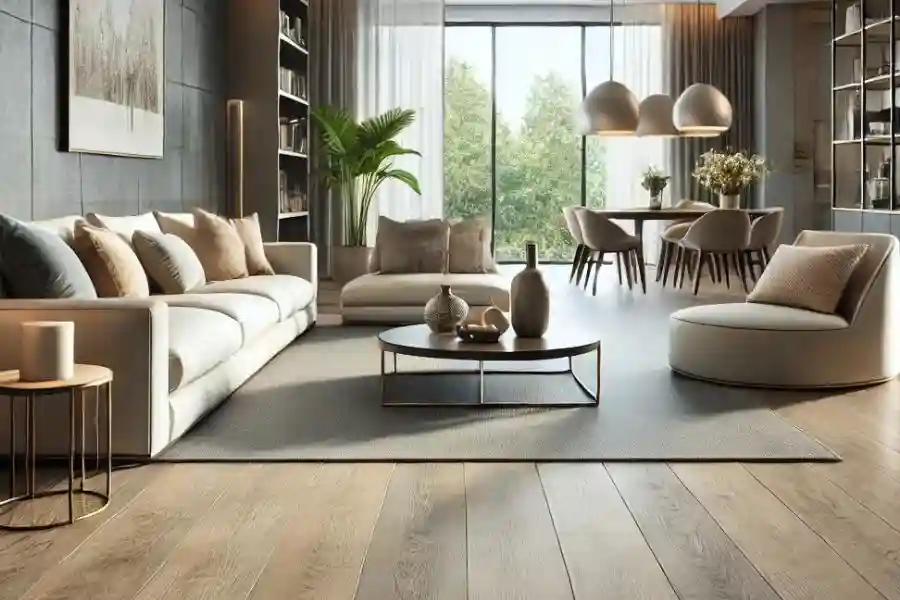Many homeowners love the comfort and aesthetics of luxury vinyl plank (LVP) flooring due to its opposition to water, durability, and design choices. This raises a common question, though: Will smell make it through interlock luxury vinyl plank flooring style? From pet accidents to spills to everyday wear and tear, you must discover how LVP flooring manages odors to maintain a fresh home.
With that behind us, we are going to go into more detail about how the smell-resistant properties of interlocking floor planks work, what factors could determine whether odors stay in your flooring, and provide you with some suggestions on how you can make sure your floor remains smelling odor-free as they should be.
Key Takeaways:
- Luxury Vinyl Plank (LVP) flooring is designed to be highly resistant to moisture and odors.
- Proper installation and cleaning are crucial for maintaining odor resistance.
- Understanding the role of moisture barriers and air circulation helps prevent odor penetration.
- While LVP flooring resists odors, underlayment and subfloor conditions play a role in overall odor management.
What Is Interlocking Luxury Vinyl Plank Flooring?
But before we attack the subject of whether scents can pass through this type of unique flooring, learn a bit more about what interlocking luxury vinyl plank flooring is and why it is such a famous choice for residential and commercial areas around.
Luxury Vinyl Plank, sometimes referred to as LVP, is man-made and offers a similar appearance to real wood or natural stone. Interlocking LVP snaps together to create a tight, seamless surface.
- Great for moist places: The locking system enables you to lock the floor tiles securely in the area but will hold up against much vapor.
- Simple installation: Interlocking planks can be easily installed as they are not glued or nailed to the floor.
- Strength: The mixture of layers such as a wear layer and a protective coating renders LVP flooring scratch, stain, and impact resistant – perfect for high-traffic regions.
Interlocking LVP flooring makes for a dense, water-resistant design, which is one reason odor-wise it’s so strong. However, some circumstances affect how long odors will stay with us, and we will look into this in more detail.
How Does Odor Penetration Work in Flooring Materials?
A better understanding of how odor penetration works across all flooring materials can help you make sense of why luxury vinyl plank flooring performs so well at resisting it. Odor penetration is the process by which odor particles (from food, pets, or chemicals) penetrate the molecule from a material’s surface and structure.
Odors can become trapped in the fibers of porous materials like carpet, as well as hardwood and untreated concrete. These materials contain little pockets, and these retain moisture and organic matter that contribute to odors.
On the other hand, Luxury Vinyl Plank flooring is non-porous. The dense synthetic layers and protective coatings form an impermeable barrier to block moisture and odor molecules. Hence:
- Moisture is unable to penetrate the boards.
- The bacteria that cause odor are unlikely to flourish.
LVP flooring is also odor-resistant, even in high-moisture areas such as kitchens and bathrooms. Yet this does not rule out the possibility that odors may occur under some particular conditions, such as poor installation, subfloor conditions, or wrong cleaning —as we explained it in the following section.
Can Moisture Cause Odors Under LVP Flooring?
Although the planks themselves are highly water-resistant and will prevent odors from remaining, what is underneath can leak offensive smells over time. Moisture can accumulate beneath the planks (generally found between the subfloor and LVP), resulting in a musty smell.
If spills, leaks, or a poor stamp result in tangled moisture under the planks, this makes an ideal atmosphere for mildew and mildew to grow, which can leave you with undesirable odors.
To prevent this from happening, you will want to:
- Use a moisture barrier under the floor during installation.
- Check areas of moisture (bathrooms, basements) often for leaks or dampness.
- Use the right type of underlayment designed to resist moisture and decrease the risk of water buildup.
Keeping the subfloor dry is key to maintaining an odor-free environment. While the LVP planks are unlikely to pick up odors, a non-protected subfloor can allow moisture through and let unwanted smells build up.
Cleaning and Maintenance Tips for Preventing Odors
Aside from being odor-resistant, proper cleaning and maintenance are necessary to maintain your luxury vinyl plank flooring for years. To keep your floors smelling clean, you may want to sweep them daily if possible and mop them at least weekly, as dust, dirt, and spills have a way of building up in layers that can contribute to floor odor.
- Mopping with warm water and a pH-neutral cleaning solution on a regular basis prevents the development of bacteria that cause odor.
- Address spills immediately: Clean spills, especially those involving liquids such as coffee, wine, or pet accidents, before they have a chance to seep between the seams or through grout lines.
- Ventilation: Proper ventilation of rooms with LVP flooring can alleviate moisture buildup and reduce the chance of mold spore development.
If you ever notice an odor coming from your LVP, sprinkle some floor-safe deodorizers or baking soda in the area to help absorb it (but keep in mind that this is more of a preventative step than it is a necessity for this type of flooring)
Can Pet Odors Penetrate LVP Flooring?
Most pet owners worry about accidents and general wear from pets affecting their floors. A popular choice for protection is Luxury Vinyl Plank (LVP) Flooring, an affordable, pet-friendly option that is water-resistant and designed to prevent pet odors.
Thanks to its non-absorbent and tightly interlocking system, messes like pet urine or spills can be easily cleaned up without fear of liquid penetrating the flooring.
Nonetheless, a small amount of care will help avoid any issues:
- Clean Up Pet Accidents Quickly: While LVP flooring doesn’t absorb liquids, it’s still vital to clean up messes rapidly to stop liquid seeping into seams or along edges.
- Use Rugs in High-Traffic Zones: If your pet frequently runs across the floor, placing a rug in the areas they spend the most time will minimize scratching and help keep high-traffic areas clean.
Interlocking LVP flooring is not threatened by pet accidents, but regular cleaning can prevent surrounding odors
The Importance of Proper Installation in Odor Resistance
Another determinant of whether or not an odor can penetrate your flooring is how good the installation process was. Correct installation ensures the interlocking planks fit tightly with no gaps between them, which protects against moisture or odors from getting into the surface.
Installation Tips to Avoid Odor Problems:
- Proper Subfloor Preparation: One of the primary causes of odor from LVP flooring is an improperly prepared subfloor. Imperfections may create pockets that trap moisture.
- Moisture Barrier: Install a moisture barrier under your LVP in moisture-prone areas to prevent odors caused by dampness.
- Check for Gaps or Seams: Ensure the planks are tightly locked and that no gaps are left between them to keep odors at bay.
Practicing correct installation not only extends your flooring’s lifespan but also strengthens its odor resistance over time.
Conclusion
However, because luxury vinyl plank is so robust, nonporous, and moisture-resistant, it is easier to keep free of odors than many other types of flooring. Whether you have pets, spills, or worry about moisture, LVP will effectively prevent unwanted smells.
What type of flooring resists odors the best? Do certain floors vary in smell resistance? Visit our other blog posts for additional flooring tips to keep your home looking fresh and clean!

